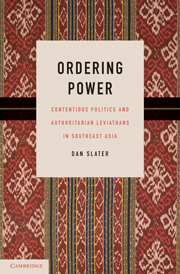Book contents
- Frontmatter
- Contents
- Map, Tables, and Figures
- Acknowledgments
- Map Contemporary Southeast Asia
- Part I The Puzzles and Arguments
- Part II Contentious Politics And The Institutions Of Order
- Part III The Foundations and Fates of Authoritarian Leviathans
- 6 Protection and Provision in Authoritarian Leviathans
- 7 Contentious Politics and the Struggle for Democratization
- Part IV Extending the Arguments
- Bibliography
- Index
7 - Contentious Politics and the Struggle for Democratization
Published online by Cambridge University Press: 05 June 2012
- Frontmatter
- Contents
- Map, Tables, and Figures
- Acknowledgments
- Map Contemporary Southeast Asia
- Part I The Puzzles and Arguments
- Part II Contentious Politics And The Institutions Of Order
- Part III The Foundations and Fates of Authoritarian Leviathans
- 6 Protection and Provision in Authoritarian Leviathans
- 7 Contentious Politics and the Struggle for Democratization
- Part IV Extending the Arguments
- Bibliography
- Index
Summary
Introduction
One of the central messages of this book has been that patterns of contentious politics profoundly shape the initial foundations of authoritarian Leviathans. Contentious politics also profoundly shapes authoritarian Leviathans’ ultimate fates, when political crises call their continuing survival into question. When swarms of ordinary people team up with pivotal sets of elites to challenge an authoritarian regime in the streets of a capital city, a seemingly stable dictatorship can fall victim to a “democratic revolution” in what superficially appears to be a stunningly short span of time.
To be sure, democratic revolutions are neither necessary nor sufficient for a democratic transition to take place. Democratization can occur through an authoritarian regime's electoral defeat or internal splintering, both of which are made more likely by severe economic crisis – and democratic uprisings are as likely to end in authoritarian crackdowns as democratic transitions. Yet the emergence of a cross-class urban protest movement, willing to risk repression by confronting a dictatorship's coercive apparatus at a polity's geographic and symbolic center, serves as the most powerful stimulant for an authoritarian retreat. Even when a dictatorship suffers a shocking defeat at the polls or devastating defections from its inner ranks, it can take massive cross-class democratic mobilization to push a wobbly regime over the political precipice. In fact, it is often the rise of such a movement that makes a dictatorship lose an election or suffer worsening dissension among ruling elites in the first place.
- Type
- Chapter
- Information
- Ordering PowerContentious Politics and Authoritarian Leviathans in Southeast Asia, pp. 197 - 226Publisher: Cambridge University PressPrint publication year: 2010



